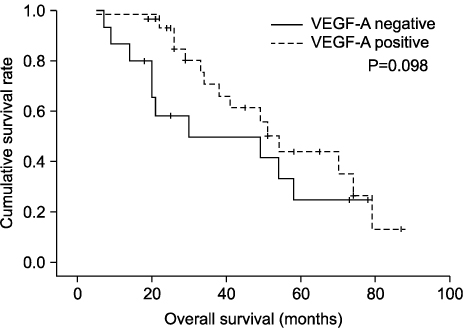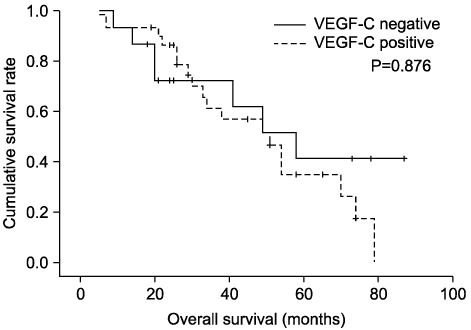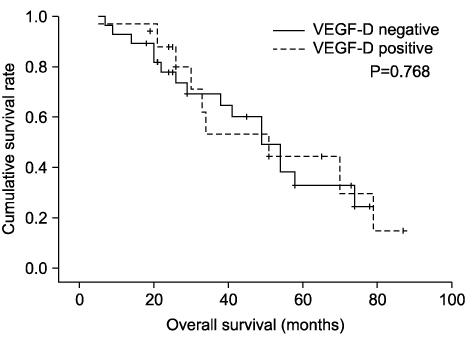J Korean Surg Soc.
2009 May;76(5):307-315. 10.4174/jkss.2009.76.5.307.
Comparative Analysis of Vascular Endothelial Growth Factor-A, C, D Expression in Colorectal Cancer with Liver Metastasis
- Affiliations
-
- 1Department of Surgery, Research Institute for Medical Sciences, College of Medicine, Chungnam National University, Daejeon, Korea. songis@cnuh.co.kr
- 2Department of Pathology, Research Institute for Medical Sciences, College of Medicine, Chungnam National University, Daejeon, Korea.
- KMID: 2096551
- DOI: http://doi.org/10.4174/jkss.2009.76.5.307
Abstract
- PURPOSE
We aimed to investigate the correlations between expressions of angiogenic cytokines VEGF-A, C, D of primary colorectal cancer and liver metastasis. METHODS: We examined paraffin-embedded primary colorectal cancer tissue from 45 patients who had liver resection due to colorectal liver metastasis (metastasis group) and 37 patients who had surgical resection due to colorectal cancer only (control group). In the control group, local recurrence and distant metastasis had not occurred. Immunohistochemical staining for VEGF-A, C and D was performed. We analysed the correlations between expression of VEGF-A, C and D in primary colorectal cancer tissues and clinicopathologic parameters. RESULTS: VEGF-A expressions of primary colorectal carcinoma were not different between the two groups. VEGF-C was more frequently expressed in the metastasis group (P=0.008) but VEGF-D was more expressed in the control group (P=0.003). Patients with VEGF-C negative and VEGF-D positive expression were predominant in the control group (P=0.020). Tumor location, T stage, lymph node metastasis and tumor differentiation were not related with the expressions of VEGF-A, C, D but only preoperative CEA was positively correlated with VEGF-A and C expression. CONCLUSION: Expressions of VEGF-C in primary tumor were more frequent in metastatic colorectal cancer and expressions of VEGF-D were more frequent in nonmetastatic colorectal cancer. More large-scale prospective studies for VEGF-C and D expression in colorectal cancer are necessary.
Keyword
MeSH Terms
-
Colorectal Neoplasms
Cytokines
Humans
Liver
Lymph Nodes
Neoplasm Metastasis
Recurrence
Vascular Endothelial Growth Factor A
Vascular Endothelial Growth Factor C
Vascular Endothelial Growth Factor D
Cytokines
Vascular Endothelial Growth Factor A
Vascular Endothelial Growth Factor C
Vascular Endothelial Growth Factor D
Figure
Reference
-
1. Park JK, Kim NK, Lee KY, Lee WJ, Kim BR, Sohn SK, et al. Prognostic factors affecting survival rate following hepatic resection for metastatic colorectal cancer. J Korean Surg Soc. 2001. 61:583–587.2. Jenkins LT, Millikan KW, Bines SD, Staren ED, Doolas A. Hepatic resection for metastatic colorectal cancer. Am Surg. 1997. 63:605–610.3. Yang Y, Forslund A, Remotti H, Lonnroth C, Andersson M, Brevinge H, et al. P53 mutations in primary tumors and subsequent liver metastases are related to survival in patients with colorectal carcinoma who undergo liver resection. Cancer. 2001. 91:727–736.4. De Jong KP, Stellema R, Karrenbeld A, Koudstaal J, Gouw AS, Sluiter WJ, et al. Clinical relevance of transforming growth factor alpha, epidermal growth factor receptor, p53, and Ki67 in colorectal liver metastases and corresponding primary tumors. Hepatology. 1998. 28:971–979.5. Folkman J. What is the evidence that tumors are angiogenesis dependent? J Natl Cancer Inst. 1990. 82:4–6.6. Folkman J. Tumor angiogenesis: therapeutic implications. N Engl J Med. 1971. 285:1182–1186.7. Veikkola T, Alitalo K. VEGFs, receptors and angiogenesis. Semin Cancer Biol. 1999. 9:211–220.8. Peters KG, De Vries C, Williams LT. Vascular endothelial growth factor receptor expression during embryogenesis and tissue repair suggests a role in endothelial differentiation and blood vessel growth. Proc Natl Acad Sci U S A. 1993. 90:8915–8919.9. Joukov V, Pajusola K, Kaipainen A, Chilov D, Lahtinen I, Kukk E, et al. A novel vascular endothelial growth factor, VEGF-C, is a ligand for the Flt4 (VEGFR-3) and KDR (VEGFR-2) receptor tyrosine kinases. EMBO J. 1996. 15:290–298.10. Kaipainen A, Korhonen J, Mustonen T, van Hinsbergh VW, Fang GH, Dumont D, et al. Expression of the fms-like tyrosine kinase 4 gene becomes restricted to lymphatic endothelium during development. Proc Natl Acad Sci U S A. 1995. 92:3566–3570.11. Achen MG, Jeltsch M, Kukk E, Makinen T, Vitali A, Wilks AF, et al. Vascular endothelial growth factor D (VEGF-D) is a ligand for the tyrosine kinases VEGF receptor 2 (Flk1) and VEGF receptor 3 (Flt4). Proc Natl Acad Sci U S A. 1998. 95:548–553.12. Dvorak HF, Brown LF, Detmar M, Dvorak AM. Vascular permeability factor/vascular endothelial growth factor, microvascular hyperpermeability, and angiogenesis. Am J Pathol. 1995. 146:1029–1039.13. Niki T, Iba S, Tokunou M, Yamada T, Matsuno Y, Hirohashi S. Expression of vascular endothelial growth factors A, B, C, and D and their relationships to lymph node status in lung adenocarcinoma. Clin Cancer Res. 2000. 6:2431–2439.14. Amioka T, Kitadai Y, Tanaka S, Haruma K, Yoshihara M, Yasui W, et al. Vascular endothelial growth factor-C expression predicts lymph node metastasis of human gastric carcinomas invading the submucosa. Eur J Cancer. 2002. 38:1413–1419.15. Kitadai Y, Amioka T, Haruma K, Tanaka S, Yoshihara M, Sumii K, et al. Clinicopathological significance of vascular endothelial growth factor (VEGF)-C in human esophageal squamous cell carcinomas. Int J Cancer. 2001. 93:662–666.16. Tischer E, Mitchell R, Hartman T, Silva M, Gospodarowicz D, Fiddes JC, et al. The human gene for vascular endothelial growth factor. Multiple protein forms are encoded through alternative exon splicing. J Biol Chem. 1991. 266:11947–11954.17. Houck KA, Ferrara N, Winer J, Cachianes G, Li B, Leung DW. The vascular endothelial growth factor family: identification of a fourth molecular species and characterization of alternative splicing of RNA. Mol Endocrinol. 1991. 5:1806–1814.18. Cheung N, Wong MP, Yuen ST, Leung SY, Chung LP. Tissue-specific expression pattern of vascular endothelial growth factor isoforms in the malignant transformation of lung and colon. Hum Pathol. 1998. 29:910–914.19. George ML, Tutton MG, Janssen F, Arnaout A, Abulafi AM, Eccles SA, et al. VEGF-A, VEGF-C, and VEGF-D in colorectal cancer progression. Neoplasia. 2001. 3:420–427.20. Cascinu S, Staccioli MP, Gasparini G, Giordani P, Catalano V, Ghiselli R, et al. Expression of vascular endothelial growth factor can predict event-free survival in stage II colon cancer. Clin Cancer Res. 2000. 6:2803–2807.21. Salven P, Lymboussaki A, Heikkila P, Jaaskela-Saari H, Enholm B, Aase K, et al. Vascular endothelial growth factors VEGF-B and VEGF-C are expressed in human tumors. Am J Pathol. 1998. 153:103–108.22. Akagi K, Ikeda Y, Miyazaki M, Abe T, Kinoshita J, Maehara Y, et al. Vascular endothelial growth factor-C (VEGF-C) expression in human colorectal cancer tissues. Br J Cancer. 2000. 83:887–891.23. Furudoi A, Tanaka S, Haruma K, Kitadai Y, Yoshihara M, Chayama K, et al. Clinical significance of vascular endothelial growth factor C expression and angiogenesis at the deepest invasive site of advanced colorectal carcinoma. Oncology. 2002. 62:157–166.24. Stacker SA, Achen MG, Jussila L, Baldwin ME, Alitalo K. Lymphangiogenesis and cancer metastasis. Nat Rev Cancer. 2002. 2:573–583.25. Stacker SA, Stenvers K, Caesar C, Vitali A, Domagala T, Nice E, et al. Biosynthesis of vascular endothelial growth factor-D involves proteolytic processing which generates non-covalent homodimers. J Biol Chem. 1999. 274:32127–32136.26. Onogawa S, Kitadai Y, Tanaka S, Kuwai T, Kimura S, Chayama K. Expression of VEGF-C and VEGF-D at the invasive edge correlates with lymph node metastasis and prognosis of patients with colorectal carcinoma. Cancer Sci. 2004. 95:32–39.
- Full Text Links
- Actions
-
Cited
- CITED
-
- Close
- Share
- Similar articles
-
- Differences in Expression of VEGF-A, VEGFR-1, VEGFR-2 and Microvessel Density in Colorectal Cancer with Liver Metastasis
- Expression of Vascular Endothelial Growth Factor (VEGF) and p53 in Colorectal Cancer
- Expression of Vascular Endothelial Growth Factor in Colorectal Cancer
- STAT3, a Poor Survival Predicator, Is Associated with Lymph Node Metastasis from Breast Cancer
- Expression of Placenta Growth Factor in Colorectal Carcinomas




